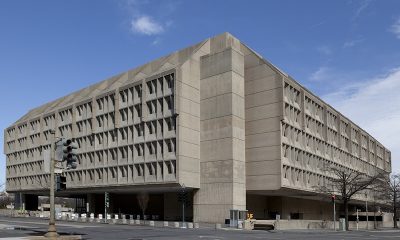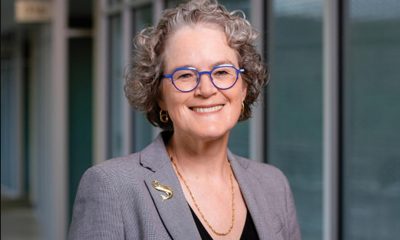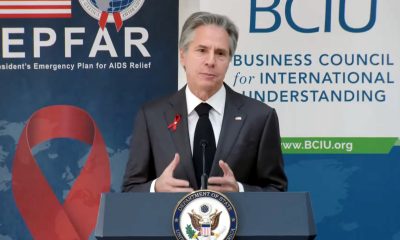Coronavirus
HIV activists hail Fauci amid coronavirus crisis — but it wasn’t always that way
Before serving as Trump watchdog, NIH director developed meds to beat HIV
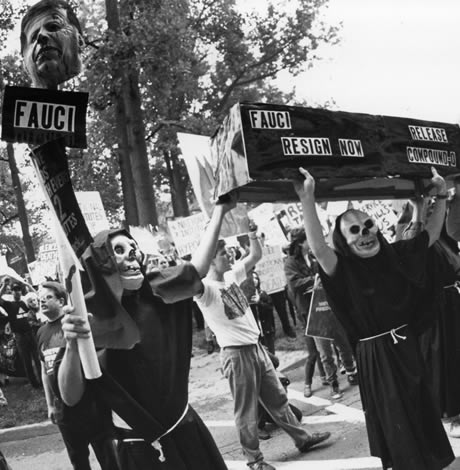
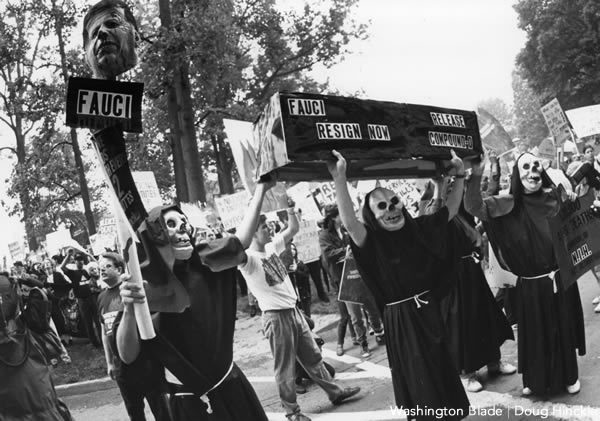
Dr. Anthony Fauci, a leading voice of medical authority as the world confronts the coronavirus, is no stranger to viral epidemics — nor protesters who once displayed him in effigy in frustration amid new infections and rising death tolls.
At the height of the HIV/AIDS crisis in the early 1990s, Fauci was at the frontlines as director of the National Institutes of Allergy & Infectious Diseases, a role he began in 1984 and continues to this day. During that time, Fauci’s research contributed to the understanding of HIV’s destruction of the immune system and therapy that has significantly contained the disease in more recent years.
Now, as a member of the White House Coronavirus Task Force, Fauci has provided sage advice, calmed fears, and — at times — acted as voice of accountability for the Trump administration amid efforts to contain COVID-19.
As the coronavirus epidemic began to unfold, Fauci himself compared the situation to the early days of the HIV epidemic — as well as other diseases — because “there’s still a lot that’s unknown.“
“It’s not that different than the very early years of the HIV epidemic, of the anthrax attacks, of the concern about the pre-pandemic bird flu,” Fauci said March 9 on CNN’s “New Day.” “Everything has a little bit of a different twist to it. It’s not exactly the same, but there’s always that uncertainty that gets people very anxious.”
Under Fauci’s leadership, NIH in 1987 developed AZT, or zidovudine, the first antiretroviral approved for the treatment of HIV, although the epidemic continued. After more research, when combinations of drugs were seen to be effective against HIV, NIH cleared the way for more effective therapy in 1996.
Carl Schmid, executive director of the HIV & Hepatitis Policy Institute, was among the advocates fighting HIV/AIDS who hailed Fauci’s work both then and now.
“No one does a better job at explaining and conquering infectious diseases, whether it is HIV/AIDS or coronavirus, than Tony Fauci,” Schmid said. “Not only is he one of the world’s top infectious disease doctors but he knows how to articulate complicated issues and on top of it, understands how to address them utilizing an all parts of society approach. He has been there since the earliest days of the AIDS crisis and can take all of what he has learned and done over the years, including working with presidents of both parties, to now deal with the coronavirus.”
But it wasn’t always a happy relationship with HIV/AIDS activists. As the HIV/AIDS epidemic raged and continued to the claim the lives of thousands of gay men, Fauci was the target of activists who accused him of not moving quickly with new medicines to fight the disease.
ACT UP, the grassroots network that held “die-in” protests to draw attention to mass fatalities from HIV/AIDS amid silence from the U.S. government, held a massive demonstration at the National Institutes of Health on April 21, 1990, as reported at the time by the Washington Blade and published in a subsequent article now available in the archives.
According to the article, written by veteran Blade reporter Lou Chibbaro, Jr., more than 1,000 demonstrators marched through the sprawling grounds of the NIH “using placards, costumes, bull horns and red-colored tape to draw attention to their demand for faster government action on AIDS research programs.”
One photo taken at the event by the Blade — but never published until now — shows three protesters dressed in black robes and skull masks in the style of the Grim Reaper.
The three hold a large coffin-like box with letters reading, “Fauci: Resign Now — Release Compound: O.” Another holds a sign reading, “120,000 AIDS Deaths, Courtesy NIH.” Another holds up a pole within a bloody head mask on top and a sign underneath designating the effigy as “Fauci.”
“Scores of drugs and alternative treatments languish untested while more than 200 new cases of AIDS are diagnosed each day,” stated ACT UP in papers distributed at the demonstration.
Police reportedly arrested 61 protesters during the four-hour demonstration and charged them with trespassing, including five members of ACT UP/D.C.
Following the demonstration, Fauci reportedly said he was sympathetic to ACT UP’s cause, but believes its allegations were untrue. Further, Fauci was quoted as saying NIH implemented recent changes to direct more resources to fight infections diseases like HIV/AIDS.
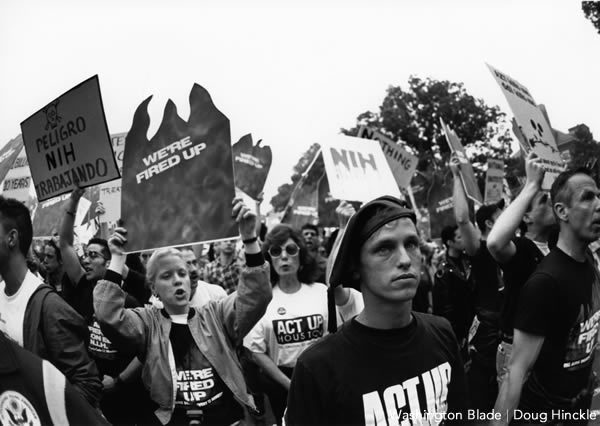
A chief critic of Fauci was Larry Kramer, a longtime HIV/AIDS activist who helped found ACT UP in the late 1980s and remains hostile to this day. As recently as 2015, Kramer in an op-ed for The Advocate faulted Fauci for failing to live up to his promise to find a cure for HIV infection. (Kramer didn’t respond to a Blade email this week to comment on Fauci’s approach to the coronavirus.)
Kramer’s harsh words may be persiflage. Fauci was quoted in a 2012 article in the New Yorker about Larry Kramer as saying he’s come to regard the activist as a friend, crediting his work with instituting a major change in medicine against infectious diseases.
But to say the relationship between HIV/AIDS activists and Fauci was entirely frosty would be inaccurate. On Dec. 22, 1990, also as reported by the Blade, when President George H.W. Bush met with gay men with AIDS at NIH, Fauci was among those who took part in the discussion.
Also at the meeting was first lady Barbara Bush and George Bush, Jr., otherwise known as future President George W. Bush. It was the first time “a sitting U.S. president formally met with open gays,” the Blade reported at the time.
The presidential party, Fauci reportedly said, listened to the gay men in attendance and sat in on a support sessions for people undertaking NIH’s experimental AIDS drug trials. Some of the men had HIV, some had developed AIDS, the Blade reported.
The elder Bush shook hands with each of the men and presented them with a commemorative presidential tie pin, according to the Blade.
“He was really touched,” Fauci was quoted as saying. “This was not just a formality. He was really interested.”
The meeting, Fauci reportedly said, was open to the White House press corps and news photographers took photos of the elder Bush shaking hands with the men.
“But much to his disappointment, Fauci said, almost all the photos appearing in the nation’s daily newspapers the next day were of a different part of the NIH visit — when the president cradled babies with AIDS in the NIH pediatric ward,” the Blade reported.
Asia Russell, executive director of the New York-based group HealthGAP, was among the HIV/AIDS activists at the time and told the Blade this week that work was responsible for pushing Fauci into supporting the community.
“Dr. Fauci has been the target of AIDS activists’ campaigns and protests in the past, and those protests delivered results — they helped him see how access to the benefits of science is not neutral, it’s driven, or hindered, by politics, and that remains true today,” Russell said.
Thirty years after the massive protest at NIH, the nature of the virus inspiring fear among the public and responsible for the deaths of thousands worldwide has changed, but Fauci’s work has not.
Russell said Fauci in his role within the White House Coronavirus Task Force has brought to the fore shortcomings in the Trump administration’s approach to COVID-19, which she said “has been a disgrace.”
“It’s an embarrassment that Dr. Fauci, a trusted voice in public health, has to testify before Congress and make the rounds on the Sunday shows to contradict the lies the president is telling,” Russell said.
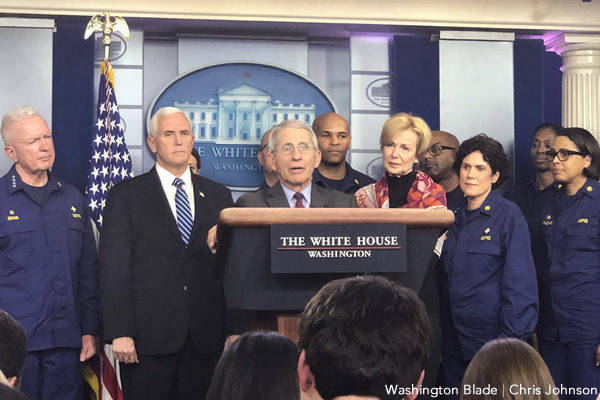
In media appearances and testimony before Congress, Fauci has made clear the severity of the coronavirus. Meanwhile, President Trump has falsely said Americans are at “low risk” of contracting the disease, predicted “it will go quickly” and said testing was available to everyone.
“It is a failing. Let’s admit it,” Fauci said last week in the testimony before the House on the lag in testing availability. Days later, Trump declared under questioning in a Rose Garden press conference he would “not take responsibility” for the delay in tests, which weren’t delivered on a massive scale until last week.
When Trump said a vaccine for coronavirus would be ready in two months (which the White House retconned as a reference to an Ebola vaccine), Fauci told the reporters it would be more like 12 to 18 months even on an expedited basis.
Fauci has also given credit to Trump, who continues to tout his travel ban on China amid early reports about the coronavirus of the evidence of his prescience about the danger. Addressing reporters last week in a White House gaggle, Fauci said that move “absolutely” made a difference in limiting new infections in the United States.
Amid self-imposed quarantines, travel bans and recommendations people not meet in groups with more than 10 people, Fauci has also reassured the American public any perception the federal government is overreacting is misplaced.
“I’ll say it over and over again: When you’re dealing with an emerging infectious diseases outbreak, you are always behind where you think you are if you think that today reflects where you really are,” Fauci said. “That’s not word speak. It means: If you think you’re here, you’re really here, because you’re only getting the results; therefore, it will always seem that the best way to address it were to be doing something that looks like it might be an overreaction.”
Michael Ruppal, executive director of the AIDS Institute, said Fauci is a trusted voice because “his communication is straight forward and direct and isn’t convoluted by political spin.”
“Dr. Fauci has been a trailblazer and leader in the HIV/AIDS pandemic since the beginning,” Ruppal said. “He has been a trusted federal partner to the HIV/AIDS community, and we appreciate having him continue to lead efforts at NIH after all these years and advancements. Dr. Fauci has been thrust forward as the federal face of the U.S. response and his integrity and honesty speaks for itself throughout his handling of this uncharted and unprecedented territory regarding COVID-19.”
But Fauci isn’t the only member of the White House Coronavirus Task Force who cut their teeth on epidemiology during the time of the HIV/AIDS crisis.
Among them is Deborah Birx, U.S. Global AIDS Coordinator & U.S. Special Representative for Global Health Diplomacy at the State Department, whose three-decade-long career has focused on HIV/AIDS immunology, vaccine research and global health.
At a White House briefing on Monday, Birx recalled the fight against HIV/AIDS during the height of the epidemic, urging Americans to exhibit the same tenacity in the struggle against the coronavirus.
“We had another silent epidemic: HIV,” Birx said. “And I just want to recognize the HIV epidemic was solved by the community: the HIV advocates, and activists who stood up when no one was listening and got everyone’s attention. We’re asking that same sense of community to come together and stand up against this virus.”
Russell had favorable words for both Fauci and Birx in their approach to the coronavirus pandemic amid her general criticism of the Trump administration.
“The administration’s delays, dissembling, and political games are killing people,” Russell said. “Dr. Fauci and Ambassador Birx know that activists are watchdogging this effort and are ready to raise the alarm.”
Also on the White House Coronavirus Task Force with a history of HIV research is Robert Redfield, director of the Centers for Disease Control. In addition to his work against the coronavirus, Redfield is seen as the point-person for the Trump administration’s plan to beat HIV/AIDS in the Untied States by 2030.
In an interview last year with the Washington Blade, Redfield credited the LGBTQ community for coming forward to participate in testing during the early of the HIV/AIDS epidemic, saying that led to medical advances that helped thwart the disease.
But Redfield notably hasn’t been present at the White House briefings with the rest of the coronavirus task force. Meanwhile, media reports have indicated White House officials have blamed him for the sluggishness in the rollout of coronavirus testing capabilities.
White House Deputy Press Secretary Judd Deere rejected the notion Redfield’s absence was of any significance. “CDC is based in Atlanta, which is where Dr. Redfield is needed, and he’s actively involved in the work of the task force and stopping the spread of COVID-19,” Deere said.
Coronavirus
D.C. mayor to lift all restrictions on bars, nightclubs on June 11
‘We will definitely be celebrating Pride’ next month
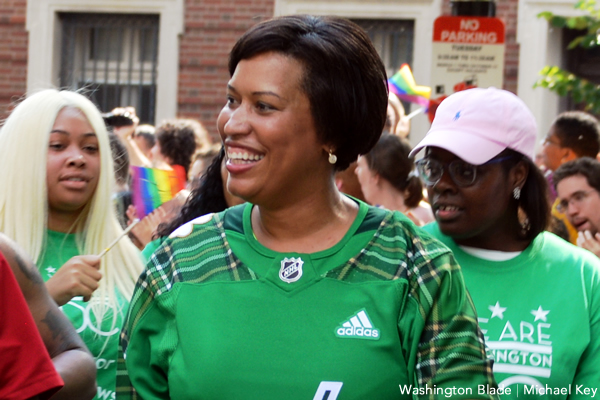
D.C. Mayor Muriel Bowser announced at a news conference on Monday that a continuing trend of significantly lower numbers of coronavirus cases and deaths in the city has enabled her to fully lift capacity and other restrictions on most businesses, including restaurants and places of worship, on May 21.
The mayor said bars and nightclubs will be allowed to increase indoor capacity from the current 25 percent to 50 percent on May 21, with all capacity restrictions for bars and nightclubs to be removed on June 11.
The mayor’s announcement came after representatives of the city’s nightlife businesses, including the city’s gay bars and restaurants, expressed concern that D.C. had yet to lift its capacity restrictions beyond 25 percent while surrounding jurisdictions in Maryland and Virginia had already lifted most restrictions.
“On May 21, restrictions on public and commercial activity, including capacity limits, types of activities, and time restrictions, will be lifted,” the mayor’s directive says.
It says restrictions for bars and nightclubs would continue at a 50 percent capacity from May 21 through June 11. The directive says restrictions for large sports and entertainment venues would also continue from May 21 to June 11, which includes a requirement such events apply for a waiver of the restrictions on a case-by-case basis.
“On June 11, capacity limits and restrictions will be lifted on those venues that cannot fully reopen on May 21,” the directive says.
In response to a question at the news conference, Bowser said the June 11 date would essentially end all restrictions on nightclubs and bars, including the current requirement that they close at midnight rather than the pre-epidemic closing times of 2 a.m. on weekdays and 3 a.m. on weekends.
In a development that could have a major impact on plans for D.C.’s LGBTQ Pride events, the mayor’s revised health directive announced on Monday includes the lifting of all capacity restrictions on large outdoor and indoor sports and entertainment events beginning on June 11.
That change would remove restrictions that have, up until now, prevented D.C.’s Capital Pride Alliance from holding its annual Pride Parade and Festival in June during Pride Month.
Capital Pride Executive Director Ryan Bos told the Washington Blade shortly after the mayor’s announcement that Capital Pride is assessing its options for expanding its current plans for in-person events in June.
“We will definitely be celebrating Pride in June,” Bos said. “We just received this information as well. So, we will be getting further information,” he said. “We have not been informed that they will be issuing any permits yet, so at this time we are moving forward with our original plans for doing things.”
Bos was referring to a city requirement for obtaining permits for street closings and use of other public spaces for events such as a parade or street festival. He said existing plans, among other things, call for an informal parade of cars and other vehicles on June 12 that will drive throughout the city to view homes and businesses that will be decorated with Pride displays such as signs, photos, and other symbols of Pride.
Those familiar with the city’s past Pride events don’t think there will be enough time for Capital Pride to organize the traditional large parade and street festival in time for June. But Capital Pride officials have talked about holding a possible parade and festival in October, and the lifting of the capacity restrictions announced by Bowser on Monday would likely make that possible.
In addition to lifting all capacity restrictions on May 21 for restaurants, the mayor’s May 21 timeframe for lifting restrictions includes these additional venues and events:
- Weddings and special events
- Business meetings and seated conventions
- Places of worship
- Non-essential retail
- Personal services
- Private at-home gatherings
- Libraries, museums, galleries
- Recreation Centers
- Gyms and fitness centers
- Pools
- Office space
- Schools
- Childcare
“We’re very pleased that over the last several days, we have seen our case spread, our community spread numbers, venture out of the red into the yellow and fast approaching the green,” Bowser said in referring to a health department chart that shows the changes in coronavirus cases in the city.
“You might remember that our daily case rate peaked in January at 45.9. And today you can see it’s down to 6.6,” she said at her news conference on Monday.
“Throughout this process I have said how proud I am of D.C. residents and businesses who have responded, who have followed health guidance and have worked together to help protect our community throughout the pandemic. And we see it in these numbers today,” she said.
“Containing the virus will continue to require all of us to be focused on maintaining a robust health system,” the mayor said, adding that while over 200,000 D.C. residents have been fully vaccinated since December 2020, “many more thousands” still need to be vaccinated. “Vaccines are free and available on demand at walk-up sites across the District,” she said.
The mayor also noted that the city will continue to require residents and visitors to use a mask in accordance with existing and updated guidance set by the U.S. Centers for Disease Control and Prevention.
Mark Lee, coordinator of the D.C. Nightlife Council, an association that represents restaurants, bars, nightclubs and other entertainment venues, said the mayor’s directive on May 10 leaves some details to be addressed but will open the way to bring nightlife businesses back to life.
“What we do know is that on Friday, May 21, businesses begin returning to normal operations and, three weeks later, on June 11, all restrictions for all businesses in the District will end,” Lee said. “It’s a day we’ve long awaited and one that will save much of our community enterprise from financial ruin.”
Coronavirus
DC residents with HIV eligible for COVID vaccine
Mayor announces expanded eligibility as vaccine supply increases
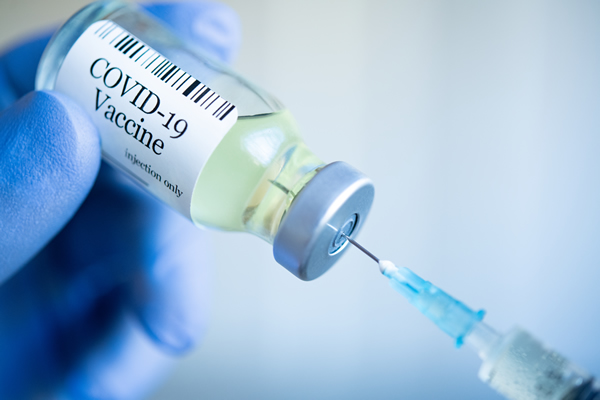
D.C. Mayor Muriel Bowser announced on Feb. 24 that D.C. residents between the ages of 16 to 24 who have one of 19 pre-existing medical conditions, including HIV, will now be eligible to make an appointment to receive the COVID-19 vaccine.
The mayor and D.C. Department of Health Director Dr. LaQuandra Nesbitt said the appointments could be made through the city’s special site, vaccinate.dc.gov, beginning Thursday and Friday, Feb. 25 and 26. The vaccinations themselves for the expanded group of residents, including people with HIV, would begin March 1, the mayor said in an announcement.
Abby Fenton, a spokesperson for Whitman-Walker Health, the D.C. community health center that provides services to the LGBTQ community and people with HIV, said Whitman-Walker has begun contacting its HIV patients about the availability of the COVID vaccine for them.
“We are urging people to try to make an appointment with the city because we have such a limited supply,” Fenton said. She said Whitman-Walker is dispensing the vaccine for those who the city determines are eligible at its medical center locations at 1425 14th Street, N.W., and at its Max Robinson Center at 2301 Martin Luther King Jr. Ave., S.E.
Michael Kharfen, the DOH official in charge of the city’s HIV/AIDS, Hepatitis, STD, and Tuberculosis Administration, said the limited supplies of the COVID vaccine that the city has been receiving from the federal government has prevented the allocation of vaccine supplies to community health centers like Whitman-Walker until a few weeks ago.
He said supplies of the vaccine have increased in recent weeks and the Department of Health was hopeful that it will be able to provide additional supplies of the vaccine to community health centers and other facilities and health care providers.
Kharfen noted that the city has been increasing the availability of the vaccine to different groups of residents in stages as supplies have increased. Front line medical workers and nursing home residents were the first to receive the vaccine. The most recent group to become eligible prior to the mayor’s most recent expansion this week were people 65 years of age and older.
The mayor’s announcement on Feb. 24 listed these pre-existing medical conditions, including HIV, that would make city residents between the ages of 16 and 64 eligible for the COVID vaccine:
Asthma, Chronic Obstructive Pulmonary Disease (COPD), and other Chronic Lung Disease; Bone Marrow and Solid Organ Transplantation; Cancer; Cerebrovascular Disease; Chronic Kidney Disease; Congenital Heart Disease; Diabetes Mellitus; Heart Conditions, such as Heart Failure, Coronary Artery Disease, or Cardiomyopathies; HIV; Hypertension; Immunocompromised State; Inherited Metabolic Disorders; Intellectual and Developmental Disabilities; Liver Disease; Neurologic Conditions; Obesity, BMI ≥ 30 kg/m2; Pregnancy; Severe Genetic Disorders; Sickle Cell Disease; and Thalassemia.
Coronavirus
D.C. gay bars struggling to stay open in pandemic
Mayor’s new rule banning liquor sales after 10 p.m. called ‘devastating’
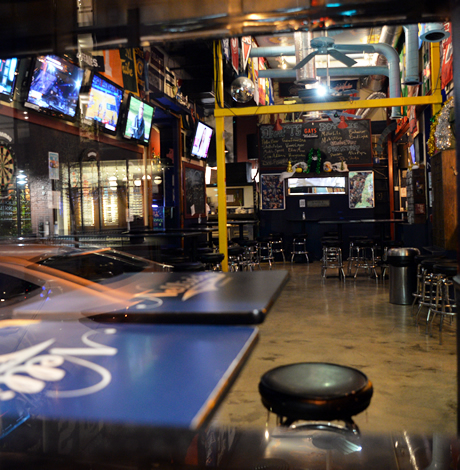
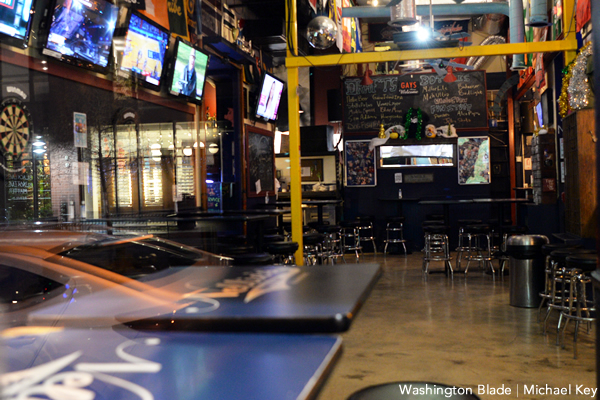
John Guggenmos, co-owner of the D.C. gay bars Number 9 and Trade, says he and his business partners support Mayor Muriel Bowser’s efforts to keep people safe as the number of people testing positive for COVID-19 continues to rise in the city.
But Guggenmos and other gay bar owners say the mayor’s most recent order requiring bars and restaurants to stop serving alcoholic beverages after 10 p.m. has had a devastating impact on what had already been a major decline in business since the COVID restrictions were put in place earlier this year.
“We see hope on the horizon,” Guggenmos said. “But for many places it’s just going to be too late. It is sad because even if I am in a position that we can weather this storm better, if other places in the neighborhood don’t, then we all suffer.”
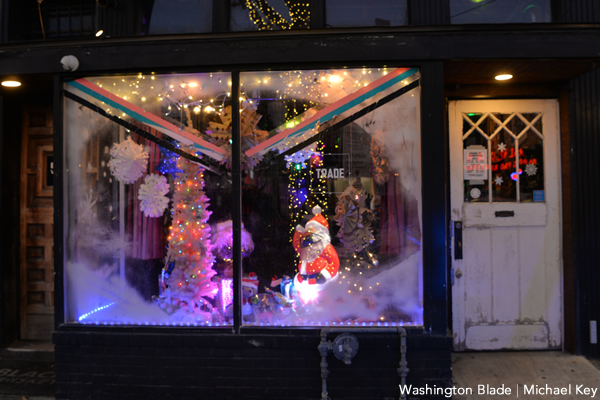
David Perruzza, owner of the Adams Morgan gay sports bar Pitchers and its adjoining lesbian bar A League of Her Own, said gay bar customers traditionally come out to the clubs after 9 p.m. and often remain there several hours later.
Under the mayor’s current Phase II rules for addressing the COVID health emergency all restaurants and bars must close at midnight, two hours earlier than the pre-epidemic closing time of 2 a.m. during the week and three hours sooner than the normal 3 a.m. closing time on weekends. That restriction by itself has resulted in a significant drop in revenue for bars and nightclubs, including LGBTQ clubs, officials with the clubs have said.
The new restriction put in place last month banning liquor sales after 10 p.m. allows bars and restaurants to continue to stay open until midnight. But Guggenmos, Perruzza and other bar owners say few if any customers would likely come in to order non-alcoholic beverages. Thus they and nearly all of the city’s bar and restaurant owners have decided to close at 10 p.m. until the restrictions are lifted, a development that has further curtailed their businesses.
“I’ve had the worst two weekends of my life at the bar,” said Perruzza in referring to the weekends following the ban on liquor sales after 10 p.m. “I can’t sustain a business this way,” he said.
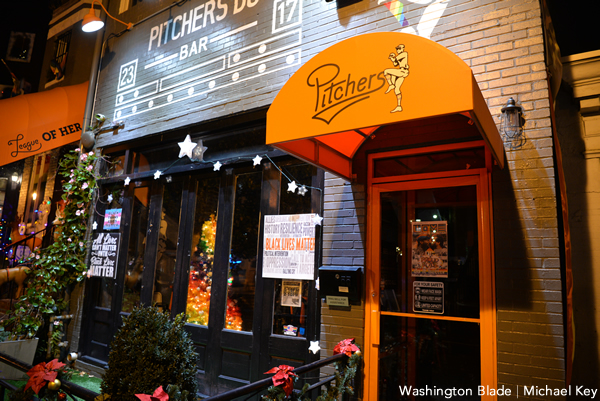
Dr. LaQuandra Nesbitt, director of the D.C. Department of Health, has said city inspectors have found that more violations of the COVID-related health restrictions at restaurants and bars, such as social distancing and mask wearing, were occurring after 10 p.m. as patrons consumed more alcohol. But nightlife advocates have disputed claims that riskier behavior occurs after 10 p.m. They say there are no studies or data to back up those claims.
Perruzza said he understands that while the mayor’s intention is to curtail the spread of the coronavirus he believes the 10 p.m. cutoff on alcohol service will result in large numbers of bar customers going to private parties in people’s homes where there will be fewer safeguards to curtail the virus.
“By her doing this she is going to push people to have more house parties,” Perruzza said. “At least if they’re in a restaurant or bar they’re in a controlled environment where they take their temperature. They make sure everything is sanitized after people leave,” Perruzza said. “People are not required to wear masks when they go to house parties.”
Prior to the start of the pandemic, D.C. was home to at least 15 gay bars or nightclubs in which the clientele was largely LGBTQ. A number of other D.C. bars and nightclubs are considered LGBTQ friendly, according to gay D.C. nightlife advocate Mark Lee, who said those additional establishments have a significant LGBTQ clientele.
In March, Bowser issued her initial emergency health order requiring all “non-essential” businesses, including bars and restaurants, to temporarily close their indoor operations to customers in an effort to curtail the spread of the coronavirus. Carryout food and drink orders were allowed, and some of the gay clubs joined other bars and restaurants in putting in place a take-out order business.
A short time later, the DC Eagle, the city’s longest continuously operating gay bar, announced it was permanently closing. The Eagle’s majority owner filed for Chapter 7 bankruptcy following longstanding financial problems, but many of the Eagle’s customers believe the pandemic played some role in the permanent shutdown.
At the same time, the popular LGBTQ nightclub Ziegfeld’s-Secrets closed its doors indefinitely after the owner of the building where it was located in the city’s Buzzard’s Point area invoked its longstanding plan to demolish the building to make way for a new condominium and retail development. Ziegfeld’s-Secrets manager Steve Delurba said the club would like to reopen in a new location but efforts to reopen would have to wait until all COVID-19 restrictions on such establishments were lifted.
Among the city’s remaining 13 LGBTQ bars and clubs, all but one has reopened after the mayor put in place the city’s Phase II business reopening plan in June, which allowed bars, restaurants, and other businesses to resume limited indoor operations.
The Fireplace, a gay bar at 2161 P St., N.W. near Dupont Circle, decided to remain closed rather than operate under the COVID restrictions but “definitely” plans to reopen, according Larry Ray, a longtime customer who said he spoke with one of the owners.
Among the other Phase II restrictions for bars, restaurants and nightclubs put in place by Bowser in the spring was the requirement that such establishments must operate at 50 percent of their normal indoor capacity, all patrons must be seated at tables spaced six feet apart, and at least three food items must be served that are prepared on the premises regardless of whether the establishment was exempt from serving food prior to the pandemic. The Phase II order also bans the establishments from offering live entertainment.
Two weeks ago, when the mayor issued her updated order banning the serving of alcoholic beverages after 10 p.m. at bars and restaurants, she also included in the order a reduction in the capacity of customers from 50 percent to 25 percent based on concern that the number of COVID-19 cases was rising in D.C. after the case number had gone down in the spring and summer.
Perruzza told the Blade that due to the Phase II social distancing requirements and the spacing of tables and the ban on allowing customers to stand except to walk in and out and go to the bathroom, Pitchers and his adjoining bar A League of Her Own were never able to reach a 50 percent capacity. At most, he said, he was able to reach a 33 percent capacity, which now must be reduced to 25 percent.
Meanwhile, the D.C. gay bar Dirty Goose at 913 U St., N.W. is among the establishments hit with a fine for allegedly violating the Phase II food serving requirement. According to a report in the Washington City Paper, an inspector from the city’s Alcoholic Beverage Regulation Administration on Nov. 27 cited Dirty Goose for serving only cookies as a food item, saying it failed to provide at least two other types of food such as popcorn or brownies instead of just cookies.
Co-owner Justin Parker told City Paper he plans to contest the citation on grounds that the establishment serves multiple types of cookies that are prepared on the premises and that the different types should be accepted as different food types. He said that ABRA inspectors came to Dirty Goose six or seven times in November prior to citing him for the food violation and found his establishment to be in full compliance with all of the COVID related requirements.
On its Facebook page the Dirty Goose announced on Nov. 10 that it had voluntarily closed its doors after one of its employees tested positive for COVID and out of caution it would remain closed until all remaining employees were tested. On Nov. 15 it announced “we have received all our employees test results and we are ready to reopen,” which happened less than a week later.
In a Nov. 25 Facebook message, Dirty Goose conveyed what appears to be the sentiment shared by the other LGBTQ bar owners and operators.
“First, we would like to thank all of our wonderful family of patrons who have kept us going since May,” the message says. “What a crazy 8 months it’s been!” After announcing the Dirty Goose would be closing at 10 p.m. each day due to the mayor’s order banning alcohol sales after that hour, the message added, “We look forward to continue serving all of you and please know we are continuously following the safety requirements set by the DOH and the safety of our staff and patrons remains our main priority.”
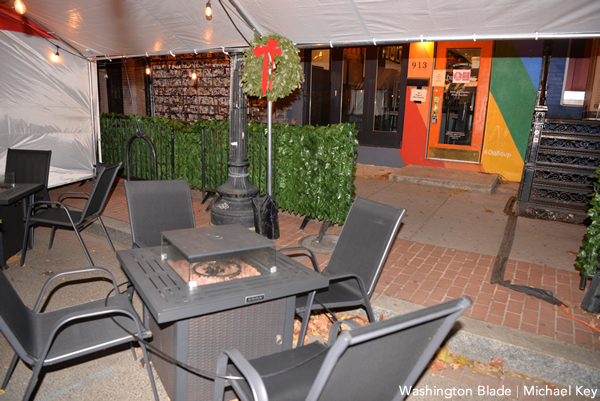
Lee, the longtime D.C. nightlife advocate who served as director of the D.C. Nightlife Council before being furloughed, said the 10 p.m. cutoff for the sale of liquor at bars and restaurants will be especially harmful coming with all the other restrictions.
“The most maddening aspect of Mayor Bowser suddenly halting all alcohol consumption after 10 p.m. at local bars, restaurants, and nightclubs operating in full compliance with public safety protocols and highly restricted service limitations is that there is no actual data or evidence-based rationale for this financially devastating roll-back curfew,” Lee told the Blade.
“This arbitrary edict jeopardizes the survival of hospitality establishments by causing them to lose the major portion of revenue they had been able to generate,” he said. “We’re getting reports that this decision is costing operators up to 60 percent or more of the little money they were making, leaving most with no choice other than to shut down two hours earlier rather than attempt to now serve only food items and non-alcoholic beverages until midnight,” Lee said.
Lee noted that at a press conference on Dec. 7, Bowser acknowledged that nightlife establishments, including restaurants and bars, have done an exemplary job of complying with health requirements and providing a safe space for patrons and employees.
At that press conference the mayor also said she looks forward to being able to lift all restrictions on businesses once the COVID vaccine becomes widely available. But she said that with a resurgence of COVID cases in D.C. in recent weeks along with the rise in cases in the surrounding suburbs the city could be forced once again to order the complete shutdown of indoor operations of businesses like restaurants and bars if the local COVID situation worsens.
Perruzza, Guggenmos and Doug Schantz, owner of the gay sports bar Nellie’s at 900 U St., N.W., each said their establishments and others like them serve as a place where LGBTQ people can go to be themselves, which many are unable to do at work, school, or even at home in some situations.
“At some point safe human interactions are what people are craving,” said Guggenmos. “You see someone on the street and how they desperately just want that interaction again,” he said. “If we could do that safely, why not?”
D.C.’s LGBTQ Bars/Restaurants
Nellie’s Sports Bar
900 U Street, N.W.
202-332-6355
Uproar
639 Florida Ave., N.W.
202-462-4464
The Dirty Goose
913 U Street, N.W.
JR.’s
1519 17th Street, N.W.
202-328-0090
Windows/DIK Bar
Upper floor at Dupont Italian Kitchen
1637 17th Street, N.W.
202-328-0100
Annie’s Paramount Steakhouse restaurant/bar
1609 17th Street, N.W.
202-232-0395
Larry’s Lounge
1840 18th Street, N.W.
202-483-1483
Pitchers/League of Her Own
2317 18th Street, N.W.
202-733-2558
Duplex Diner
2004 18th Street, N.W.
202-265-7828
The Fireplace
2161 P Street, N.W.
202-293-1293
[Temporarily closed during pandemic]
Number Nine
1435 P Street, N.W.
202-986-0999
Trade
1410 14th Street, N.W.
202-986-1094
Green Lantern
1335 Green Court, N.W.
202-347-4533
D.C. LGBTQ-friendly Bars/Clubs
Dacha Beer Garden
1600 7th Street, N.W.
202-350-9888
9:30 Club
815 V Street, N.W.
202-265-0930
DC 9 Nightclub
1940 9th Street, N.W.
202-483-5000
Dito’s Bar
Lower floor at Floriana Restaurant
1602 17th Street, N.W.
202-667-5937
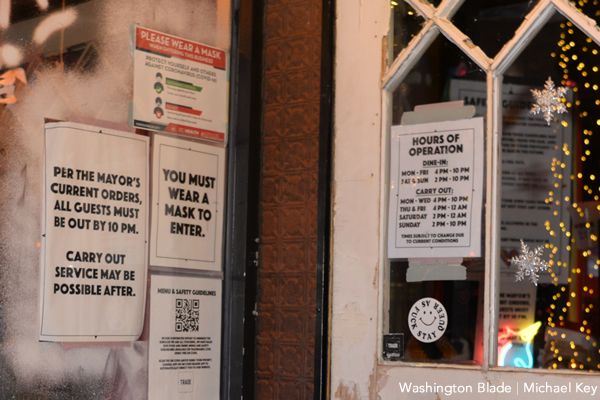
-

 U.S. Supreme Court3 days ago
U.S. Supreme Court3 days agoSupreme Court to consider bans on trans athletes in school sports
-

 Out & About3 days ago
Out & About3 days agoCelebrate the Fourth of July the gay way!
-

 Virginia3 days ago
Virginia3 days agoVa. court allows conversion therapy despite law banning it
-

 Maryland5 days ago
Maryland5 days agoLGBTQ suicide prevention hotline option is going away. Here’s where else to go in Md.

